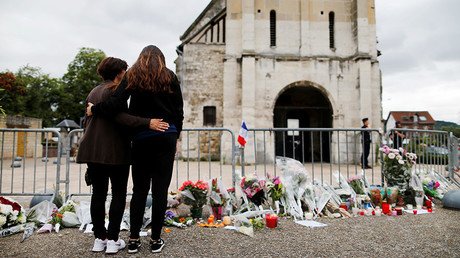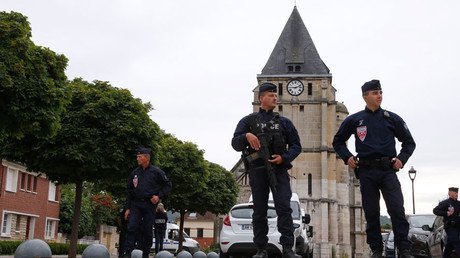Rising fear of terrorism pushes Europeans to rethink approach to right-wing parties
A chain of bloody terrorist attacks in Western Europe is forcing many to reconsider their attitudes towards right-wing parties, which not long ago were considered too extreme and sometimes even branded “fascist.”
In France, which according to President Francois Hollande is at war with the Islamic State (IS, formerly ISIS/ISIL) terrorist group, people are growing increasingly unconvinced by the arguments of left-wing politicians, RT’s Anastasia Churkina reports from Saint-Etienne-du-Rouvray.
The town in the north of France saw the country’s latest Islamic State attack, when two teenagers killed an elderly priest at a local church. Father Jacques Hamel was brought to his knees at the altar of his own church before having his throat slit.
The locals still cannot believe that such an atrocity could have taken place in their own neighborhood. “Two boys at Saint Etienne cut the throat of a priest – it’s madness. How could we know such a thing would happen here?” a local resident told RT.
The recent spike in terrorist attacks may soon shift voters’ preferences, as many no longer see right-wing parties like Marine Le Pen’s National Front (FN) as too radical.
“Here in France, we are turning towards the National Front now. People want to see change,” one man told RT. “We have always voted left, but when we see this happening where we live and when we’re scared, we are ready to vote for the far right in the hope that something will change. And I’m not alone in this opinion.”
“We have never tried the far right before. Perhaps it will make things better; perhaps it will make things worse. We’ll have to see,” another man said.
Not so long ago, Marine Le Pen was portrayed as a zealot for her harsh opposition to refugees flowing into Europe, with the press dubbing her party “toxic” and asking whether France was going “fascist.”
However, these days, more mainstream political figures like Nicolas Sarkozy are demanding tougher security and a mercilessness response to the problems created by the refugee influx.
Some European states are witnessing similar trends.
“No one can say how many terrorists have arrived among the migrants, how many are already here, and how many are arriving every day,” right-wing Hungarian Prime Minister Victor Orban said last year.
The mainstream media has dubbed such statements “politics of hate.” Austria’s chancellor, for one, likened this approach to the Nazi deportations during the Holocaust.
Yet following the recent attack in Munich, Austria is helping Hungary seal its border with Serbia and tightening security at its own with Germany.
In Germany, only the right-wing Alternative for Germany party used to draw connections between asylum seekers and terrorists.
However, now it appears that even Chancellor Angela Merkel, Europe’s main proponent of an open-door asylum policy, is finally publically connecting the dots.
“We are noticing, suddenly, that there is a very close connection between us and Syria, because there are a number of terrorists who have grown up in Europe, even in Germany, who have then trained in Syria and then some come back, and some exploit the movement of refugees to smuggle in terrorists,” Merkel stated recently.














